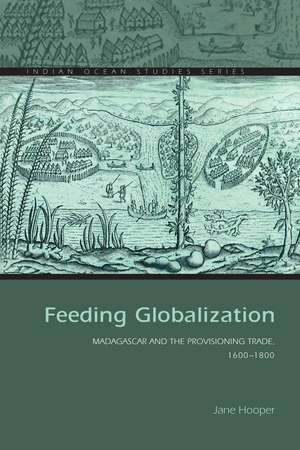Feeding Globalization: Madagascar and the Provisioning Trade, 1600–1800: Indian Ocean Studies Series
Autor Jane Hooperen Limba Engleză Paperback – 14 mai 2017
Between 1600 and 1800, the promise of fresh food attracted more than seven hundred English, French, and Dutch vessels to Madagascar. Throughout this period, European ships spent months at sea in the Atlantic and Indian Oceans, but until now scholars have not fully examined how crews were fed during these long voyages. Without sustenance from Madagascar, European traders would have struggled to transport silver to Asia and spices back to Europe. Colonies in Mozambique, Mauritius, and at the Cape relied upon frequent imports from Madagascar to feed settlers and slaves.
In Feeding Globalization, Jane Hooper draws on challenging and previously untapped sources to analyze Madagascar’s role in provisioning European trading networks within and ultimately beyond the Indian Ocean. The sale of food from the island not only shaped trade routes and colonial efforts but also encouraged political centralization and the slave trade in Madagascar. Malagasy people played an essential role in supporting European global commerce, with far-reaching effects on their communities.
Feeding Globalization reshapes our understanding of Indian Ocean and global history by insisting historians should pay attention to the role that food played in supporting other exchanges.
In Feeding Globalization, Jane Hooper draws on challenging and previously untapped sources to analyze Madagascar’s role in provisioning European trading networks within and ultimately beyond the Indian Ocean. The sale of food from the island not only shaped trade routes and colonial efforts but also encouraged political centralization and the slave trade in Madagascar. Malagasy people played an essential role in supporting European global commerce, with far-reaching effects on their communities.
Feeding Globalization reshapes our understanding of Indian Ocean and global history by insisting historians should pay attention to the role that food played in supporting other exchanges.
Preț: 312.55 lei
Nou
Puncte Express: 469
Preț estimativ în valută:
59.81€ • 62.89$ • 49.42£
59.81€ • 62.89$ • 49.42£
Carte indisponibilă temporar
Doresc să fiu notificat când acest titlu va fi disponibil:
Se trimite...
Preluare comenzi: 021 569.72.76
Specificații
ISBN-13: 9780821422540
ISBN-10: 0821422545
Pagini: 352
Ilustrații: 6
Dimensiuni: 152 x 229 x 28 mm
Greutate: 0.54 kg
Ediția:1
Editura: Ohio University Press
Colecția Ohio University Press
Seria Indian Ocean Studies Series
ISBN-10: 0821422545
Pagini: 352
Ilustrații: 6
Dimensiuni: 152 x 229 x 28 mm
Greutate: 0.54 kg
Ediția:1
Editura: Ohio University Press
Colecția Ohio University Press
Seria Indian Ocean Studies Series
Recenzii
“Jane Hooper’s groundbreaking study of Madagascar’s provisioning trade offers a fascinating new perspective on Indian Ocean exchanges, European long-distance trade, Madagascan engagement with global markets, and the transformation of the island in the early modern era.”—Jeremy Prestholdt, author of Domesticating the World: African Consumerism and the Genealogies of Globalization
“This important book highlights Madagascar’s key role in the Indian Ocean’s maritime and commercial circuits as a provider of foodstuffs and provisions.”—Pedro Machado, author of Ocean of Trade: South Asian Merchants, Africa and the Indian Ocean, c. 1750–1850
“Jane Hooper sheds light on a crucial yet unexplored aspect of early modern globalization.”—Kerry Ward, author of Networks of Empire: Forced Migration in the Dutch East India Company
"Feeding Globalization is an engaging introduction to the complexities of Indian Ocean trade and an important reminder of the importance of food and fresh water to global development.“—American Historical Review
“This is a welcome addition to the Anglophone historical scholarship on Madagascar, most of which focuses on the nineteenth century. Hooper meticulously reconstructs a convincing picture of how the steady demands of European shipping and colonies for food supplies stimulated the emergence of state formation in western and eastern Madagascar.”—Edward A. Alpers, author of The Indian Ocean in World History
Notă biografică
Jane Hooper is an associate professor in the Department of History and Art History at George Mason University. She is the author of two Ohio University Press books: Feeding Globalization: Madagascar and the Provisioning Trade, 1600–1800 (2017) and Yankees in the Indian Ocean: American Commerce and Whaling, 1786–1860. Her scholarly interests include piracy, queens, and slave trading in the Indian Ocean.
Descriere
Between 1600 and 1800, the promise of fresh food attracted more than seven hundred English, French, and Dutch vessels to Madagascar. Throughout this period, European ships spent months at sea in the Atlantic and Indian Oceans, but until now scholars have not fully examined how crews were fed during these long voyages.








